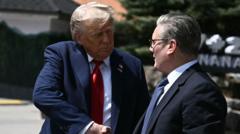Will Trump Skip Parliament Speech During UK Visit?

Understanding the Dynamics of Donald Trump's Upcoming UK State Visit
As the world watches, former President Donald Trump is preparing for his much-anticipated state visit to the United Kingdom, scheduled for September 17. This visit is marked by a mix of political tension and traditional diplomacy, raising questions about the protocol surrounding such high-profile events. Trump’s recent remarks about not recalling Members of Parliament (MPs) for a speech have added an intriguing layer to the visit's narrative. In this article, we will delve into the implications of Trump's comments, the traditional roles of state visits, and the broader context of UK-US relations.
Trump's Position on Parliament and State Visits
During an exclusive phone call with the BBC, Trump expressed his preference for MPs to enjoy their time rather than being summoned back to Parliament for his speech. He stated, “I don’t want that to... that would be making the speech pretty negatively.” This statement raises an important question about the significance of addressing Parliament during state visits and the impact of political sentiments on diplomatic engagements.
The Tradition of Addressing Parliament
Addressing both Houses of Parliament has been a tradition for visiting heads of state since the post-World War II era. However, such speeches are not guaranteed. In fact, only about one in four state visits has included a formal address to Parliament since 1952. The final decision regarding these addresses typically lies with the Speakers of the Commons and Lords, influenced heavily by the government’s arrangements. Given the backdrop of Trump's earlier visit in 2019, where he did not receive this honor due to significant opposition from over 100 MPs, the current scenario reflects ongoing political divisions.
The Timing of Trump's Visit
Trump's visit coincides with the annual party conference season, a time when the House of Commons is traditionally in recess. While the House of Lords will still be in session, the timing has been perceived as a strategic move to limit parliamentary scrutiny. Reform UK leader Nigel Farage criticized this scheduling as “shoddy,” accusing the Labour government of prioritizing relations with Europe over robust diplomatic engagement with the United States. This perspective highlights the complex interplay of domestic politics and international relations.
What Trump Hopes to Achieve
When asked about his objectives for the visit, Trump expressed a desire to "have a good time" and to show respect for King Charles III, whom he described as a “great gentleman.” His comments underscore a focus on personal rapport rather than formal diplomatic procedures, indicating a style of engagement that prioritizes personal relationships over institutional protocols. This approach aligns with Trump's broader political brand, which often emphasizes direct communication and personal connections.
Public and Political Reactions
The announcement of Trump's visit has elicited mixed reactions from UK politicians and the public. Many view his absence from Parliament as a missed opportunity for meaningful dialogue, while others support the idea of a less formal engagement. The notion of “let them have a good time” resonates with some who believe that not every state visit requires a formal address to Parliament. However, critics argue that such visits should reflect the values and principles of both nations, especially when historical ties are involved.
Comparative Analysis: Other Heads of State
Trump's upcoming visit follows a recent address by French President Emmanuel Macron, who delivered a speech to both Houses during his own state visit. This contrast highlights the differing approaches between leaders and their host nations. The reception of Macron in Parliament may reflect a more traditional diplomatic engagement compared to Trump's informal approach. Moreover, the absence of a parliamentary address during Trump's previous visit continues to color perceptions of his relationship with the UK.
The Role of the UK Government and Buckingham Palace
Downing Street has denied that the timing of Trump's visit was arranged to evade scrutiny, suggesting that questions regarding scheduling should be directed to Buckingham Palace. Official state visits are typically coordinated with government officials, and the Palace plays a crucial role in formal invitations. This collaboration underscores the importance of ceremonial aspects in diplomatic relations, as both the government and the monarchy aim to maintain a balance between tradition and contemporary political realities.
Trump's Legacy and Political Climate
As Trump prepares for this visit, it is essential to consider his legacy and the current political climate in both the UK and the US. His previous state visit in 2019 was marred by protests and political backlash, with over 100 MPs signing a motion opposing his address. Such historical context adds weight to the significance of the upcoming visit and the potential reactions it may elicit from both the political establishment and the public.
Conclusion: The Future of UK-US Relations
Donald Trump's state visit to the UK presents a unique opportunity to explore the evolving nature of international relations. As political sentiments shift and traditional protocols are reconsidered, the implications of such visits extend beyond mere ceremonial exchanges. The responses to Trump’s remarks and the decisions surrounding his address to Parliament will reflect broader themes of diplomacy, political accountability, and the enduring ties between the two nations.
As we approach the date of the visit, it will be fascinating to observe how these dynamics unfold and what they mean for the future of UK-US relations. Will the absence of a parliamentary address impact the perception of Trump's visit, or will it be viewed as a new norm in diplomatic engagements? Only time will tell.
FAQs
Why is it significant for a US president to address the UK Parliament?
Addressing the UK Parliament is a traditional honor that symbolizes respect and recognition between the two nations. It provides an opportunity for the visiting leader to outline their vision for bilateral relations and engage directly with UK lawmakers.
What are the usual protocols for state visits to the UK?
State visits typically involve formal ceremonies, meetings with key officials, and potential addresses to Parliament. The timing and scheduling of these events are often carefully coordinated between the UK government and the monarchy.
How do the political climates in the US and UK affect diplomatic relations?
The political climates in both countries can significantly impact diplomatic relations. Changes in leadership, public sentiment, and political controversies can alter the dynamics of cooperation and dialogue between the nations.
As we reflect on these upcoming events and the intricacies of international diplomacy, what do you think will be the lasting impact of Trump's visit on UK-US relations? #TrumpUKVisit #InternationalRelations #Diplomacy
Published: 2025-07-15 07:54:06 | Category: sport



